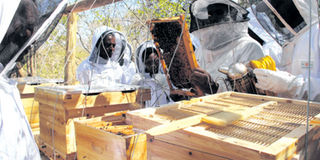A little comfort makes bees produce more

Justin Njoka and his friends at their farm in Kitui check hives for honey. PHOTO | KIHU IRIMU | NATION MEDIA GROUP
What you need to know:
- In Ukambani, one of the main source of honey in Kenya, hives are set miles apart on expansive land “because bees from different colonies always fight”.
- Njoka, who is from Kirinyaga, was trained for one week by The Hive Ltd after which he invested in Yatta where there are exceptionally big African forest bees.
- It takes 30 minutes for two people to harvest 8kg of honey from one hive. Taking too long annoys the bees and they can migrate to another home taking away all the honey.
The 120 by 100ft farm is tucked in a thick forest in the heart of Yatta Plateau such that to reach it, you have to go up and down several hills.
Wearing a white protective gear, Justin Njoka, 27, moves from one hive to another until he reaches the thirtieth checking if there is honey.
Njoka’s modern hives are raised about 4ft from the ground with each row hosting 10.
A barbed wire surrounds the apiary to protect the hives.
In Ukambani, one of the main source of honey in Kenya, hives are set miles apart on expansive land “because bees from different colonies always fight”.
However, Njoka’s modern hives called cab are 3ft from each other. He has 30 more hives on a quarter acre he has leased.
TECHNOLOGY CONSULTANCY
He owns 10 of the 30 hives while the other 20 are jointly owned with friends. He harvests between 6 and 10kg per hive about six times in a year, selling the honey to The Hive Ltd, an international firm, at Sh1,000 per kilo in a business he started in 2012.
Njoka started looking for opportunity to invest while studying Computer Science at Jomo Kenyatta University of Agriculture and Technology.
“With my Sh70,000 savings earned from information technology consultancies, I asked friends what I could invest in and one of them introduced me to beekeeping in 2012, the same year I graduated,” he narrates.
Njoka, who is from Kirinyaga, was trained for one week by The Hive Ltd after which he invested in Yatta where there are exceptionally big African forest bees.
The insects are hardworking, travelling up to 3.5km radius to collect nectar from a wide range of flowers.
His total investment was Sh135,000, which he used to buy 10 hives and a beekeeper’s startup kit for Sh80,000.
The rest of the money he spent on leasing land for Sh50,000 a year and materials for setting up and labour.
After two months, Njoka, a father of one, who had also set up Techno Africa Technologies, an IT firm that specialises in data recovery, networking and software development, harvested at least 6kg from each hive. He sold it for Sh1,000 a kilo.
It was, thereafter, that a few friends approached him for a joint venture and they added 20 hives out of which they are comfortably harvesting at least 8kg per hive, not less than six times a year and selling to the same firm.
BLACK MONEY
Black honey, which is what Njoka harvests “is in great demand across the world, “according to Joseph Karuga, the out-growers manager at The Hive Ltd. Njoka says some of the new practices he has adopted are the use of protective clothing to avoid stings instead of fire. Fire scares away bees and they may refuse to return.
He also uses centrifugal force honey extractor instead of fire to avoid discolouration and loss of flavour. He harvests during the day.
“This ensures that you can see your product and minimise contamination,” he says, adding it takes “a shorter time than it would at night causing as little disturbance to the bees as possible”.
Comfort
The hives are divided into two compartments. To harvest, the upper part is removed leaving the rest of the colony undisturbed. After the honey is harvested it is returned.
Harvesting involves controlled smoking to break communication between the bees. It is done using a hand operated device.
This is followed by removal of the capping from the cells and then extracting honey using centrifugal force extractor.
It takes 30 minutes for two people to harvest 8kg of honey from one hive. Taking too long annoys the bees and they can migrate to another home taking away all the honey.
According to Karuga, the beehive is a big contributor to the quality and quantity of honey. “The hive must offer comfort to the bees so that they can produce more,” he says, adding that the traditional hives fail to meet the standards while the imported hives do not take into account the character of the aggressive African bee.
“Many farmers return to the hive only to find the bees gone with the honey and it takes several weeks to re-colonise,” says Karuga.
“The quality of wood and workmanship should ensure 80 per cent occupation of the hive in the first one week and harvest of at least 10kg in five weeks.”
National Bee Keeping Institute notes that good hives allow for faster, easier and larger harvest while the quality of the product is guaranteed by the fact that no predators can find access to the hive.
This cannot be guaranteed in traditional hives.




